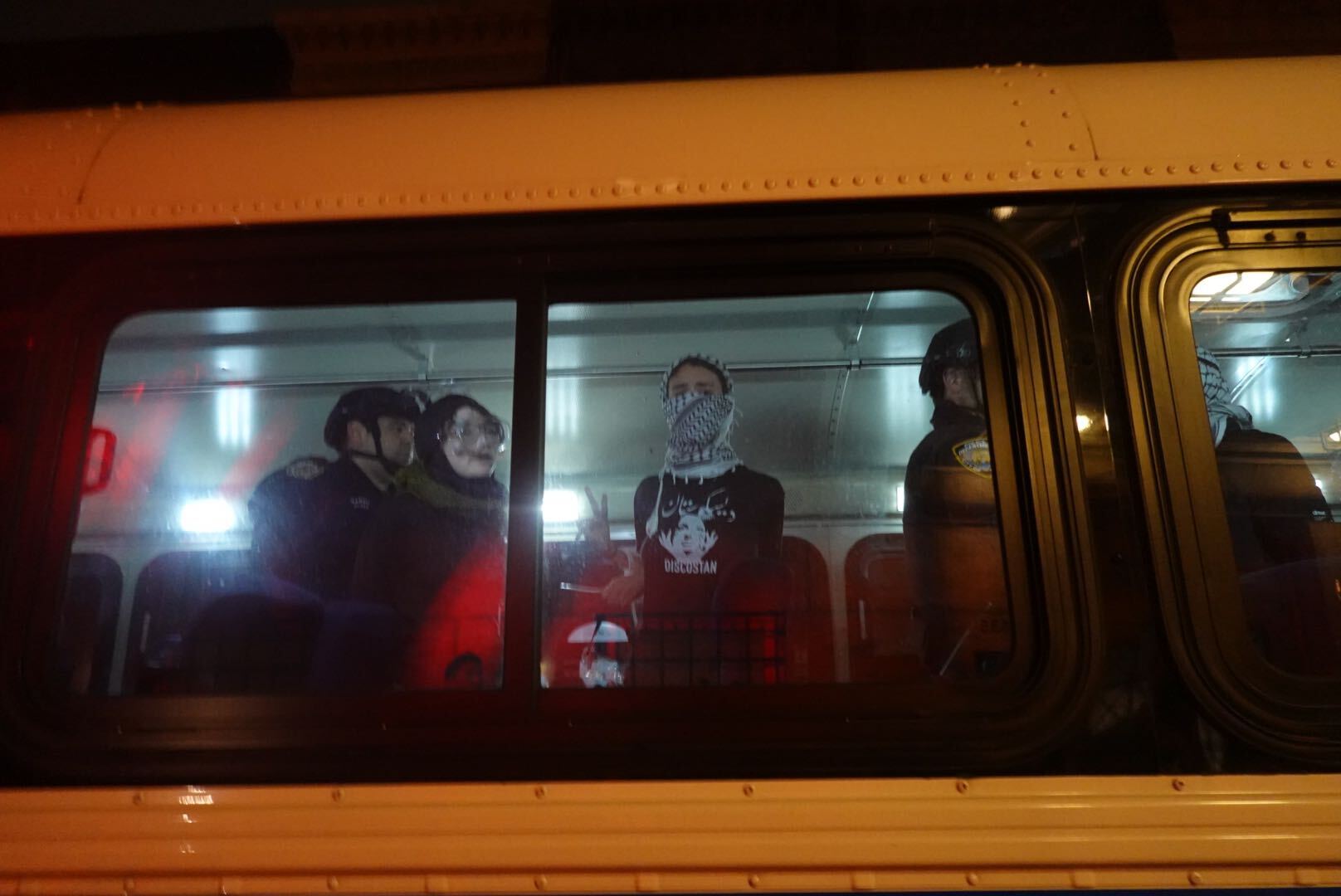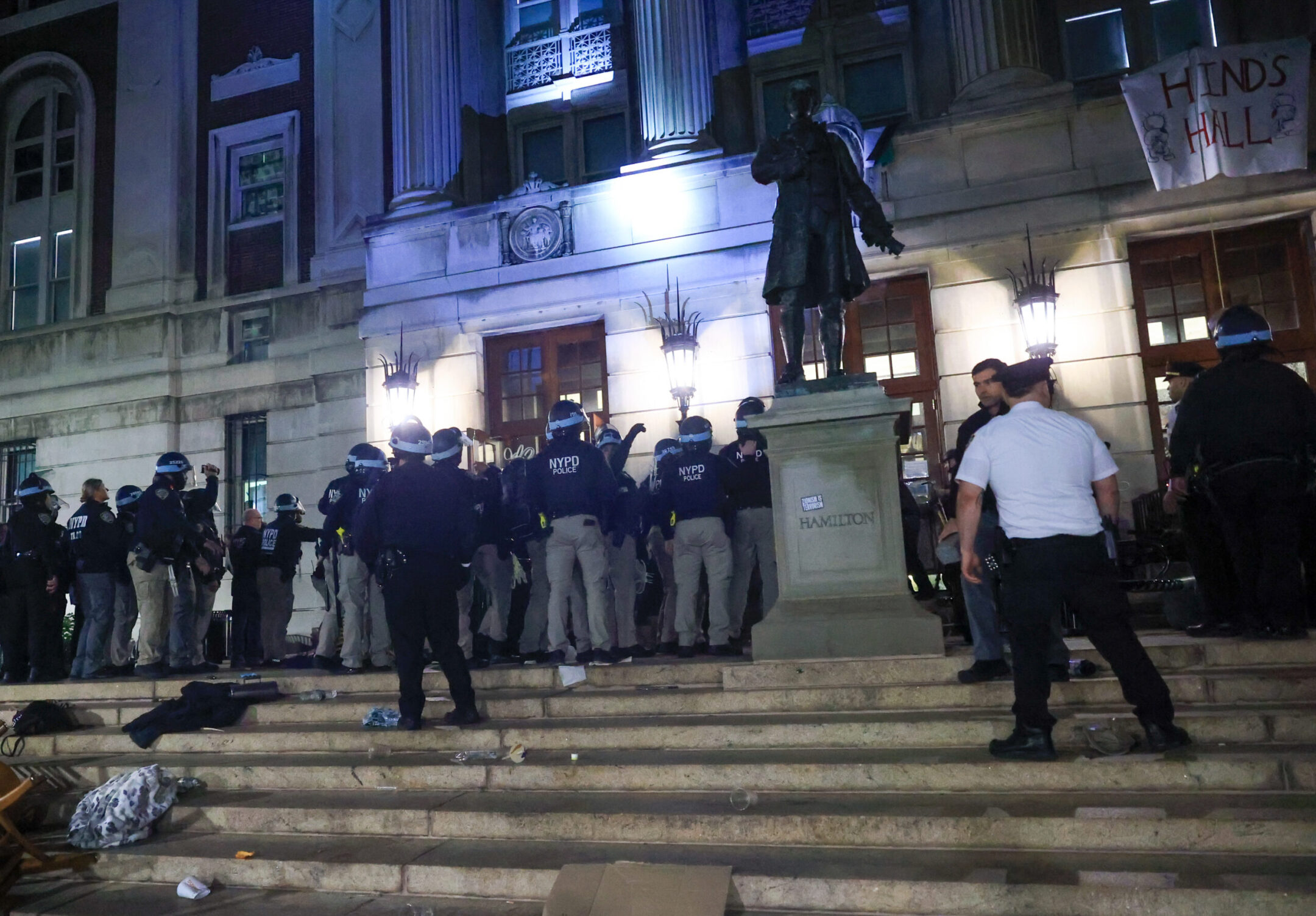Police raid Columbia University building occupied by anti-Israel protesters, arresting dozens
The dramatic crackdown marked the second time that Columbia’s president asked the NYPD to intervene against the protesters

Student anti-Israel protesters are arrested by police and removed from the campus of Columbia University in New York City, April 30, 2024. (Luke Tress)
(New York Jewish Week) — Police stormed the Columbia University building occupied by pro-Palestinian students on Tuesday night, arresting dozens, as the school’s Jewish center was placed on lockdown with students sheltering inside.
The scenes at Hamilton Hall saw protesters lying prone as they were cuffed and loaded onto NYPD vans. The arrests took place after the students broke into the building on Monday night and barricaded it with couches, chairs and vending machines, draping a banner reading “Intifada” from one of the windows.
Police in riot gear entered Columbia en masse on Tuesday evening at the university’s invitation, encircling the area around the Morningside Heights campus and ordering students to shelter in place. Police vans blocked off intersections, officers told students to remain in their dorms and the subway stop at the campus gates was closed as the NYPD attempted to curb protests in support of the activists in Hamilton Hall.
It was an escalation of the pro-Palestinian protests rocking Columbia, which began as an encampment nearly two weeks ago and have since spread to campuses nationwide. Students at those universities have set up their own encampments, leading to hundreds of arrests across the country and, in two cases, agreements with university administrators to discuss divestment from Israel along with other measures.
This was the second time in the past two weeks that the NYPD had arrested protesters on Columbia’s campus. On April 18, police entered the encampment and detained more than 100 students. Since then, the protesters have maintained a constant presence on the school grounds while engaging in negotiations with the administration.

New York Police Department officers enter Columbia University’s Hamilton Hall and detain pro-Palestinian demonstrators who had barricaded themselves inside, April 30, 2024. (Selcuk Acar/Anadolu via Getty Images)
In a statement on Tuesday, Columbia’s president, Minouche Shafik, said those talks had reached an “impasse” and that students who had not cleared out of the encampment by Monday afternoon were suspended. She asked the NYPD to come onto campus and maintain a presence there until May 17, after commencement ceremonies.
“The events on campus last night have left us no choice,” she wrote. “With the support of the University’s Trustees, I have determined that the building occupation, the encampments, and related disruptions pose a clear and present danger to persons, property, and the substantial functioning of the University and require the use of emergency authority to protect persons and property.”
The crackdown took place on the anniversary of a previous university decision to evict students who had taken over Hamilton Hall, against those protesting Columbia’s ties to the Vietnam War in 1968. Then, more than 700 students were arrested.
Despite the NYPD’s attempts at crowd control on Tuesday, hundreds gathered to protest at an intersection adjacent to Columbia, chanting “Students hold your ground, NYPD will back down” and “Resistance is glorious, we will be victorious.” Others gathered at other points near the campus, and some students joined in the chanting from their dorm room windows.
Less than a block away from the main protest, the Kraft Center for Jewish Life instructed students who were present to remain in place while the university’s security advisory was in effect. At 11 p.m., the building was still closed off, but the NYPD had declared the campus clear.
Yakira Galler, a first-year student at Barnard, Columbia’s affiliated women’s college, was headed back to campus on Tuesday night after spending the Passover holiday with her family. As they were pulling out of the driveway, she received a text alert from Barnard notifying her of the shelter-in-place order.
Instead of returning to campus, she decided to stay with cousins nearby because she said she does not feel safe returning to her dorm.
Galler said the final exam for a class she had been taking in Hamilton Hall — Yiddish — had been canceled. She said she had been watching updates about the police crackdown with mixed feelings.
“I’ve seen pictures of how many officers are there and I can understand how that’s frightening,” she said. “But it baffles me that people aren’t able to understand why that would be necessary, why this is a safety issue and why there’s a threat.”
This article originally appeared on JTA.org.















